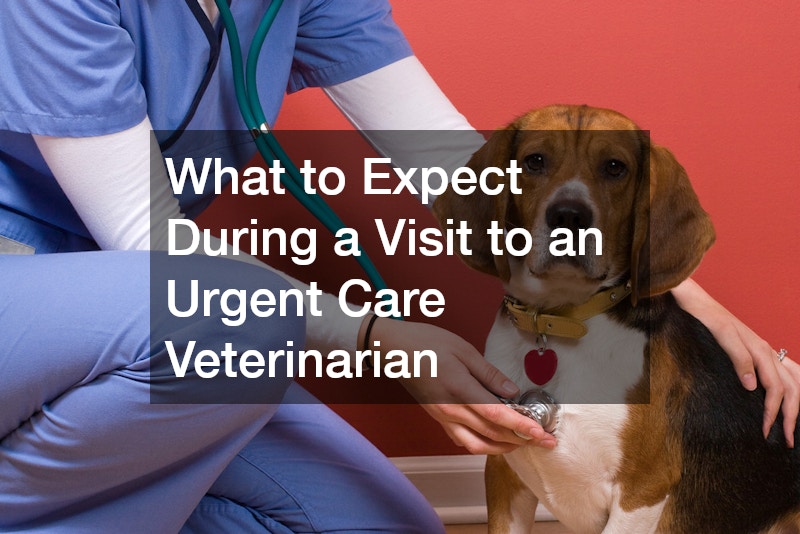When your pet is in distress, a visit to an urgent care veterinarian can be a crucial decision. Urgent care facilities provide immediate veterinary attention for pets in need of prompt medical care. Understanding what to expect during such a visit can alleviate anxiety and ensure that your pet receives the best possible care.
In today’s world, pets are more than just animals; they’re family members. When they exhibit signs of illness or injury, it becomes imperative to seek quick and effective medical intervention. An urgent care veterinarian specializes in providing immediate care that can prevent further complications and promote healing.
This article aims to prepare pet owners for what to expect during their visit to an urgent care veterinarian. By understanding the procedures, potential costs, and types of treatments available, you’ll be better equipped to make informed decisions regarding your pet’s health and well-being.
Initial Assessment
Upon arrival at an urgent care veterinary facility, the first step is usually a thorough initial assessment. This process helps the veterinary team quickly gauge the severity of your pet’s condition. Expect to be asked detailed questions about your pet’s symptoms, medical history, and any recent changes in behavior.
A skilled urgent care veterinarian will conduct a physical examination to identify any apparent issues. This examination may include checking vital signs, such as heart rate and temperature, and examining visible injuries or signs of distress. The goal is to develop a preliminary understanding of what might be ailing your pet.
During the assessment, clear communication with the veterinarian will enhance the quality of care your pet receives. Transparency about symptoms and history allows the veterinarian to make informed decisions about further testing or treatments. Gathering all necessary information promptly ensures that your pet receives the most effective and timely care possible.
Diagnosis and Testing
Following the initial assessment, the urgent care veterinarian may recommend diagnostic tests to pinpoint the underlying issue. These tests can include blood work, X-rays, or ultrasounds, which help to form a complete picture of your pet’s health status. The selection of tests often depends on the specific symptoms and initial findings from the examination.
Diagnostic testing is crucial as it enables the vet to identify conditions that are not immediately apparent during a physical examination. For instance, internal injuries or infections might require more detailed imaging to diagnose accurately. Based on the test results, the vet will develop a treatment plan tailored to your pet’s needs.
Understanding the implications of various tests and their necessity can help you feel more confident in the care being provided. While waiting for results, it’s natural to feel anxious; however, remember that these tests are essential steps in ensuring the best possible outcome for your pet. The urgent care veterinarian will keep you informed throughout the process, ensuring transparency and clarity.
Emergency Treatment and Care
In cases where immediate intervention is required, the urgent care veterinarian will initiate emergency treatment. This could involve stabilizing your pet’s condition, managing pain, or addressing life-threatening issues. Immediate care not only alleviates suffering but also prevents further deterioration of your pet’s health.
Emergency treatments may include intravenous fluids for hydration, medications to control symptoms like vomiting or seizures, or even surgery in acute cases. The veterinary team is trained to provide swift and comprehensive care tailored to your pet’s specific needs. Their expertise ensures that your pet receives the best possible treatment in a crisis.
While the urgency of the situation can be overwhelming, the veterinary team’s priority is to stabilize and improve your pet’s condition. Clear communication with the vet about your pet’s progress during treatment will help ease any concerns. Knowing that experienced professionals are working tirelessly for your pet’s recovery can offer much-needed reassurance.
Post-Visit Care and Follow-Up
Once the immediate concerns are addressed, the focus shifts to recovery and ongoing care. The urgent care veterinarian will outline a follow-up plan, which may include medication schedules, dietary changes, or activity restrictions. Understanding and adhering to this plan is crucial for your pet’s recovery and long-term health.
Frequent follow-up visits might be necessary to monitor your pet’s progress and adjust treatments as needed. The veterinarian will guide you on what signs to watch for, ensuring that any complications are promptly addressed. Staying attentive to your pet’s needs and maintaining open communication with the vet will aid in a successful recovery.
Your role in your pet’s post-visit care is significant, as adherence to the veterinarian’s instructions can impact the effectiveness of treatment. Ensuring that your pet completes the full course of any prescribed medications and follows approved activities can speed recovery. Collaboration with the veterinary team ensures that your pet enjoys a healthy, happy life post-treatment.
Your pet’s well-being is the ultimate priority, and urgent care veterinarians are dedicated to delivering the highest standard of emergency care. Embracing the collaborative relationship with your veterinary team will benefit both you and your beloved furry family member. With the right preparation and mindset, you can ensure that this encounter is as smooth and effective as possible.

